Power Articles
Industry Elevating Content
Windows and Doors - Bridging the Gap Between Privacy and Community Ethics
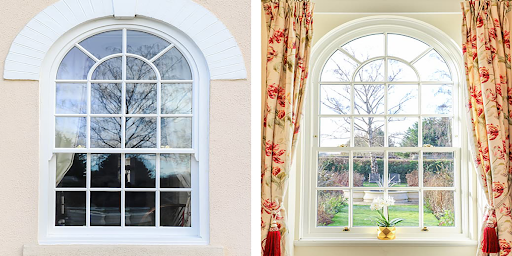
PowerArticles
Oct. 9th, 2023
In architecture and home design, windows and doors are vital conduits between the personal sphere of privacy and the communal world of ethics. Homeowners, architects, and builders often need help to balance these seemingly opposing forces. This blog delves into the intriguing domain where aesthetics, functionality, privacy, and community values converge. It will explore how the choices made in windows and door design can bridge the gap between safeguarding personal space and contributing to the aesthetics and ethics of a neighborhood. In the modern age, where notions of privacy and community are evolving, businesses that sell windows and doors have a unique role. So, let’s unlock the possibilities together and see how these essential architectural elements can make a world of difference!
Privacy in the Modern Age
The intrusion of smartphones, social media, and ubiquitous connectivity has blurred the lines between public and private life. Homeowners increasingly grapple with preserving their personal space while actively participating in the community. Here’s where the windows and doors industry comes into play:
Windows: The Portal to the World
Windows have long been the eyes of a home, offering views to the outside world while maintaining a sense of security. In the modern age, privacy-enhancing innovations have emerged, from tinted glass to intelligent windows that allow opacity adjustment at the push of a button. These solutions empower homeowners to decide when they want to be seen and when they prefer solitude.
Doors: Gatekeepers of Privacy
Doors serve as the guardians of personal space. Advanced locking systems, peepholes, and security doors offer peace of mind. However, the challenge is to make doors secure and inviting. The trend is toward aesthetically pleasing front doors that provide security without creating a fortress-like atmosphere.
In this age of evolving privacy norms, businesses in the windows and doors industry must offer products that adapt to homeowners’ needs. It’s about striking a balance between transparency and seclusion, offering options that allow individuals to control their personal space while being part of a larger community.
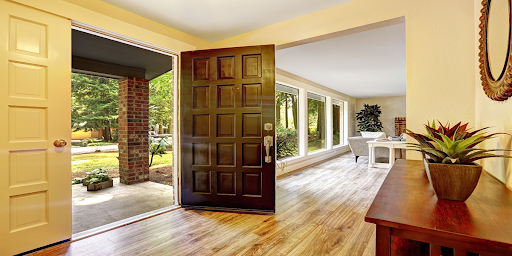
Community Ethics and Aesthetics
Communities are defined not just by the people who live there but also by the surrounding structures. The appearance of homes and buildings contributes significantly to a neighborhood’s overall aesthetics and ethics. Here’s how the choices made by homeowners and businesses in the windows and doors industry impact the communal landscape:
Community Ethics: A Shared Responsibility
Community ethics encompass how residents and businesses interact with their surroundings. It involves adhering to local regulations, respecting the visual harmony of the neighborhood, and contributing positively to the community’s overall well-being.
Aesthetics: Windows and Doors as Architectural Features
The design and appearance of individual homes influence the aesthetics of a neighborhood. Windows and doors play a central role here. For example, well-designed windows can enhance energy efficiency while also elevating the curb appeal of a property. Similarly, aesthetically pleasing front doors can firmly state the homeowner’s commitment to the community’s aesthetics.
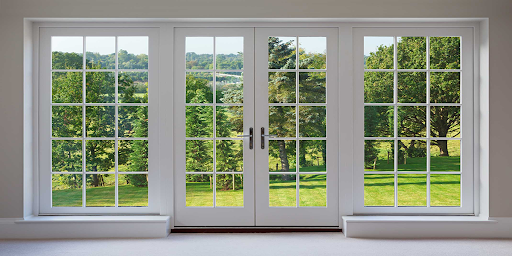
Case in Point: Balancing Aesthetics and Ethics
Consider a scenario where a homeowner wishes to replace their windows with energy-efficient ones. They can choose windows with the same style as their neighbors, ensuring a harmonious appearance, or opt for a contrasting style that still adheres to community ethics. In this way, individual preferences can coexist with the broader aesthetics and ethics of the community.
The windows and doors industry is uniquely positioned to bridge the gap between individual privacy and community ethics. It’s about providing homeowners choices that align with their values while considering the impact on the broader community.
Balancing Act: Privacy vs. Aesthetics
Maintaining privacy can be challenging in a world where urbanization is rising. Homeowners yearn for the comfort of solitude within their homes while still being an integral part of their communities. This is where the delicate balancing act of privacy and aesthetics comes into play.
Design Strategies
Successful window and door design hinges on strategies that harmonize these conflicting needs. Take, for instance, the use of frosted glass or decorative elements. These solutions allow homeowners to enjoy privacy without compromising the aesthetic appeal of their homes. Blinds or shutters can also be integrated into the design, offering homeowners control over when to invite the outside world in and when to keep it at bay.
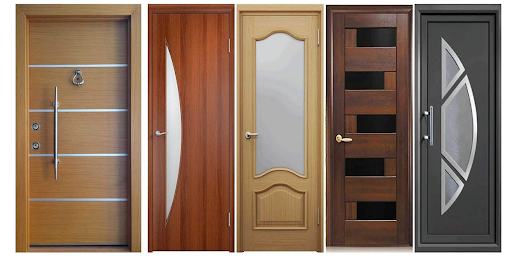
Case Studies
Real-life examples can be incredibly persuasive. Share stories of homeowners who achieved the perfect balance between privacy and aesthetics through your products. Showcase before-and-after photos, highlighting how thoughtful window and door choices transformed their homes’ appearance and overall living experience.
Legal and Ethical Considerations
For businesses in the windows and doors industry, it’s crucial to understand that the design and installation of these components often come with legal and ethical considerations. Ignoring these factors can lead to conflicts and non-compliance with local regulations.
Local Regulations
Zoning laws and building codes vary from one location to another. It’s essential to be well-versed in these regulations to ensure all your products and services align with local requirements. For instance, some areas may restrict the type of windows or doors that can be installed, especially in historic districts. Familiarize yourself with these regulations to avoid legal issues and ensure customer satisfaction.
Transparency
Ethical considerations also revolve around transparency. Be honest with your customers about what is and isn’t permissible in their area. Please encourage them to consult with local authorities or homeowners’ associations for questions or concerns. You uphold ethical standards and build trust with your customers by providing information and guidance.
Community-Friendly Window and Door Design
The concept of community ethics extends beyond just legal compliance. It encompasses the broader impact of architectural choices on a neighborhood’s aesthetics and harmony. Here’s how businesses in the windows and doors industry can contribute positively:
Sustainable Materials
In an age of environmental consciousness, sustainable materials are a significant consideration. Promote the use of eco-friendly materials in your products. Emphasize their energy efficiency and contribution to reducing a building’s carbon footprint. By aligning your offerings with community values and environmental ethics, you cater to modern consumers’ demands and contribute to a better, more sustainable world.
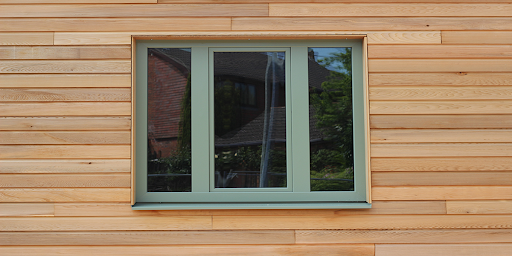
Engaging with the Community
Don’t limit your interaction with customers to transactions. Actively engage with local communities. Participate in neighborhood events, sponsor community initiatives, or offer educational workshops. By becoming an integral part of the community, you foster goodwill and gain valuable insights into your customer base’s unique needs and preferences.
Architectural Harmony
Finally, stress the importance of architectural harmony. Showcase how your products can seamlessly integrate into various architectural styles, preserving the visual integrity of the community. Provide design options that enhance the curb appeal of homes while respecting the broader aesthetics of the neighborhood.
Community Engagement
In the world of windows and doors, a profound opportunity often goes unnoticed – the power to forge deeper connections within our communities. As businesses in this industry, the journey doesn’t stop at crafting exceptional products; it extends to becoming catalysts for positive community change.
Why Community Engagement Matters
When a business actively engages with its local community, something beautiful happens. It builds trust. It fosters a sense of belonging. It transcends the transactional and becomes transformational.
Participate and Connect
Engaging with the community can take many forms. It might mean sponsoring a neighborhood event, offering educational workshops on energy-efficient windows, or supporting local initiatives. By being present and active, businesses can become integral parts of the communities they serve.
The Ripple Effect
By genuinely caring about the neighborhoods where they operate, businesses in the windows and doors industry can create a ripple effect. They inspire others to do the same. They help build stronger, more vibrant communities where everyone thrives.
Conclusion
For businesses specializing in windows and doors, the journey doesn’t end with selling products; it extends to becoming architects of community cohesion. As windows and doors frame the gateway to our homes, they simultaneously frame the aesthetics of our neighborhoods. They are bridges connecting personal sanctuary with the broader fabric of society. The modern era’s evolving concept of privacy and the ever-present need for ethical architectural choices have made this bridge all the more crucial. By understanding these dynamics, offering customizable solutions, and embracing sustainable practices, businesses can thrive and become champions of community ethics. So, let’s remember that the windows and doors industry doesn’t just deal in tangible products; it deals in the intangible bonds that connect us all.
Published By
PowerArticles
Oct. 9th, 2023